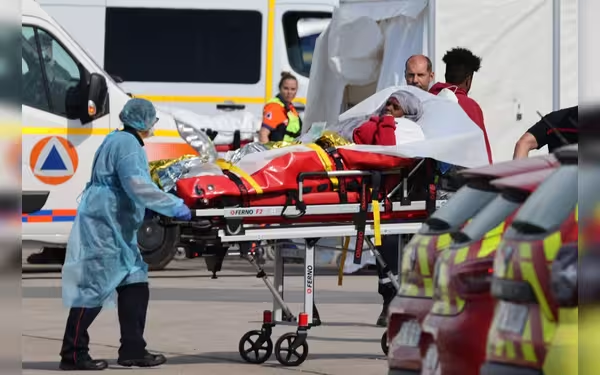Saturday, November 16, 2024 05:55 PM
Tragic Migrant Boat Capsizing in English Channel Claims 12 Lives
- 12 migrants lost their lives in Channel disaster
- Survivors recount harrowing experiences of capsizing
- Calls for urgent action to address migrant crisis
 Image Credits: arabnewspk
Image Credits: arabnewspkA tragic boat capsizing in the English Channel results in 12 migrant deaths, highlighting the ongoing crisis and urgent need for solutions.
The perilous journey across the English Channel has become a tragic reality for many migrants seeking a better life. Recently, a devastating incident occurred when a boat carrying migrants capsized, resulting in the loss of 12 lives, including that of an 18-year-old girl. This incident marks the deadliest disaster in the Channel this year, highlighting the ongoing crisis faced by those attempting to cross from France to England.
On a somber Wednesday evening, around one hundred people gathered in Calais, France, to hold a candlelight vigil in memory of the victims. Among the mourners was Biniam Semay, a 34-year-old Eritrean who witnessed the horrific moment when his sister was lost to the sea. He described how the fragile vessel was torn apart in just a few minutes, plunging dozens into the treacherous waters of the Channel. "In four or five minutes, it was completely destroyed and sank," he recounted, his voice filled with sorrow.
As the waves crashed around them, Biniam desperately clung to his sister's hand, but a powerful wave separated them. "Then the rescue ship came, and when they rescued me, I saw my sister... and she was already dead," he said, reflecting on the tragedy that unfolded before his eyes. His heart-wrenching story is a stark reminder of the dangers faced by migrants who risk everything for a chance at a new life.
The death toll from this incident is the highest since November 2021, when 27 migrants lost their lives in a similar tragedy. This has reignited tensions between France and Britain, as both countries grapple with the challenge of managing the flow of migrants. Many individuals pay smugglers thousands of euros to make the perilous journey across the Channel, often in overcrowded and unsafe boats.
Despite efforts by British Prime Minister Keir Starmer and French President Emmanuel Macron to enhance cooperation in addressing the surge of undocumented migrants, activists argue that these measures are insufficient. Feyrouz Lajili, a project coordinator for Doctors Without Borders, expressed frustration, stating, "We’re angry and upset, not least because we feel these deaths could have been prevented." The rising death toll, which has reached 25 this year compared to 12 last year, underscores the urgent need for effective solutions.
Steve Smith, head of the Care4Calais charity, echoed these sentiments, emphasizing that investments in security measures have not reduced crossings. Instead, he noted, "It is simply pushing people to take ever increasing risks to do so." This sentiment was shared by another survivor, Amanuel, who witnessed the tragic loss of life during the disaster. He described the scene as rescue boats arrived, stating, "There were a lot of girls and young boys, and I saw them die." Amanuel's harrowing experience serves as a chilling reminder of the human cost of this crisis.
French authorities have been criticized for their approach to managing the situation. While they aim to prevent migrants from taking to the water, they do not intervene once individuals are afloat, citing safety concerns. Herve Berville, the French government’s junior minister for maritime affairs, stated that all available resources were mobilized during the rescue operation. However, he acknowledged that the ongoing emergency at sea requires a broader perspective.
As the world watches this unfolding tragedy, it is essential to recognize the desperation that drives individuals to risk their lives in search of safety and opportunity. For many, like Muhammadullah, who fled Afghanistan to escape the Taliban, the only option left is to attempt the crossing again. "I don’t know else what to do," he lamented, "there’s only England left." This statement encapsulates the harsh reality faced by countless migrants who feel they have no choice but to embark on dangerous journeys in pursuit of a better future.
The recent tragedy in the English Channel serves as a stark reminder of the ongoing migrant crisis and the urgent need for comprehensive solutions. As nations grapple with the complexities of migration, it is crucial to prioritize the safety and dignity of those seeking refuge. The stories of survivors like Biniam and Amanuel should compel us to reflect on our shared humanity and the responsibility we hold to protect the vulnerable in our world.













